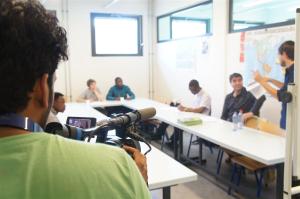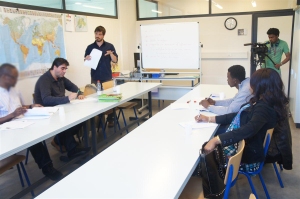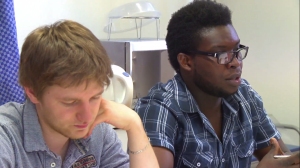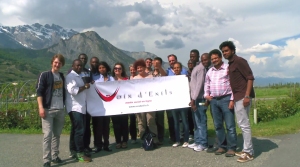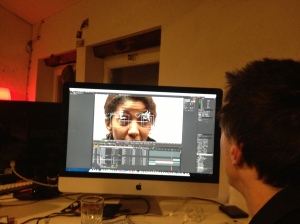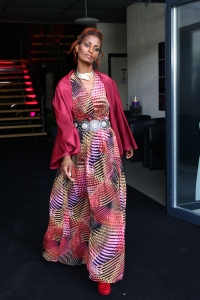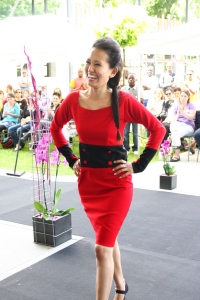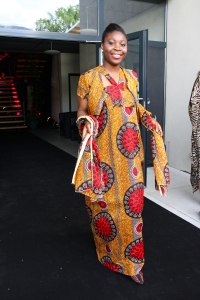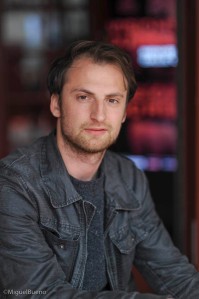
Guido Hendrikx. Director of the film « Escort ». Photo: Miguel Bueno.
Voix d’Exils participated in the festival Visions du Réel held in Nyon from 25th April to 3rd May. It is an important international film festival specializing in documentary films, one of the largest in Europe in this field. During the festival, « Escort» was one of the most shocking documentary films screened about refugees, catching Voix d’Exil’s serious attention.
The 18 minutes long film «Escort» follows two young Dutch border police recruits who undergo an intensive three-week training course intended to prepare them for their future role: deporting rejected asylum seekers back to their country of origin.
The film starts with statistics (Dutch Border Police, Dutch Marshals) about the number of refused asylum seekers who were
escorted out of The Netherlands in 2012. 4823 refused asylum seekers left the Netherlands, among which 1410 were escorted (against their will) by the police officers.
The director Guido Hendrikx tries to find the answers to the following questions like «What are the physical and mental challenges for this escort training team? How do the participants go through their training lessons? What are the techniques that they use for escorting out the refugees? How do they handle the last minutes before dealing with refugees who strongly refused to leave the country?» He transferred what he has experienced of those questions by getting his audience to travel through the movie.
Here is the interview with Guido Hendrikx conducted by Voix d’Exils via e-mail conversation.
In this interview, Guido Hendrikx talks more about his film and asylum situation in the Netherlands, in particular about the handling of rejected refugees.
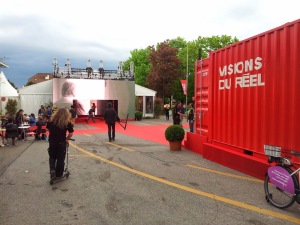
Visions du Réel festival. Photo: Voix d’Exils.
Interview:
You participated in the festival «Visions du Réel » in Nyon a few weeks ago. As a Dutch filmmaker, how did you experience the environment of the festival Nyon? What can you say about Nyon and the organizers of the festival?
I enjoyed the festival of Nyon, even though it was raining most of the time. It was very well organized, with a good program: an interesting experience for film directors. Unfortunately the debates after the film were mostly French-spoken, so I couldn’t participate.
Your film «Escort» was selected for international competition in the category «court-métrage» and was screened two times in cinema during the festival. What were the reactions, comments and critics that you got from viewers?
Unfortunately, the cinema was not really full at both screenings, which makes the film experience less interesting in my opinion. I didn’t get many reactions from the audience, but the few reactions were mostly compliments. The most interesting reaction I got from a Dutch lady who is living and working in Switzerland. She said: «I work at the airport in Geneva, and everyday I can see through my window how the Border Police in Switzerland deals with refused asylum seekers. And I can tell you, it’s much and much worse than how they deal with it in The Netherlands».
Why did you choose this subject for making a film?
For me filmmaking is nothing more – and nothing less – than a lifetime personal study of human kind. Besides, I am interested in the conflict between rational thinking and moral feelings. The film (documentary) I am working on now has the same theme. Furthermore, in Holland, many films are made from the perspective of the asylum seeker. Most of them I found not interesting, too sentimental and irrelevant. I found it interesting to change the perspective and to make a film from the viewpoint of the executors. Without accusing, without offering an excuse. I wanted to confront the audience with the system they invented themselves and to ask questions like «is a human deportation possible?» Those are some of the reasons for making this film. But, the most important one is when I read a newspaper-article about the training I was fascinated. Something I do not experience that often.
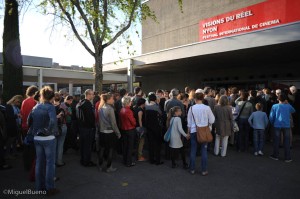
Visions du Réel festival. Photo: Voix d’Exils
In the public discussion that followed the projection of your film during the festival, you said that it was very hard to get the training team of the Dutch border police recruits to collaborate, and that you spent more than one year to convince them. What other challenges did you face during the shooting?
During the shooting we didn’t have many restrictions. Only during the scenes in the deportation-centre itself we were limited to the surveillance-camera room. But because we had little microphones, it turned out to be a helpful and interesting limitation. Thereby it was a challenge to choose the main characters of the film, because we met them for the first time at the first training day.
Did you watch the Swiss films «Vol Spécial» and «L’Escale» that are closely related to the topic of asylum seekers in the context of Switzerland? If so, how are you considering those films?
I watched «Vol Special» on Dutch Television. An impressive film. And to a certain extent an inspiration for the film I made. Where Vol Special ends, Escort starts. In short, I think the director of Vol Special did a great job.
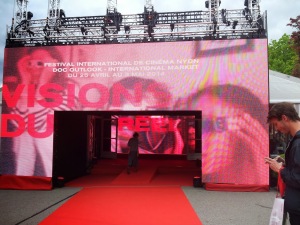
Visions du Réel festival. Photo: Voix d’Exils.
What is your personal view about European migration policy concerning asylum seekers and about Netherland’s escort act?
My personal view about European migration policy can best be summarised with the term of «organised responsibility escape». Every institution has a specific responsibility regarding migration policy, but nobody is able, or is willing, to see the whole picture. In Holland for example, at least three institutions are involved in escorting refused asylum seekers to their «homeland». One to put the signature on a piece of paper: «you have to leave»; one to «help» the refugees in the last months before departure (as we see in Vol Special for example); and one to escort. They all point to each other saying they didn’t decide this, they are not responsible. We also see this in Vol Special.
I find that mechanism very interesting. How does it work exactly etc? And maybe, even more interesting and hypocritical, I find the critics and accusations of a part of the audience, a part of the people, the so-called politically «left» people mostly, who try to blame the executors while sitting in their own lazy chair. Because I think we, myself included, most probably don’t care about refused asylum seekers. Do we agree on how they are being escorted? We simply don’t know because most people are not interested in that question.
What’s next for Escort?
Escort has been sent to several film festivals, previous week it was screened at IndieLisboa (Portugal), in two weeks it will be screened at VIS (Austria). We are also negotiating about a long version of the film with the Dutch marshals for T.V – broadcasting.
Interview by:
Sara
Voix d’Exils, Vaud
Thank to : Guido Hendrikx, Director of the Film Escort.
More details about Festival du Vision du Réel, Nyon
The festival is dedicated to showing the world as it is lived, to break away from the mainstream. It offers a diversity of committed and inspired film-making, allowing the connection of experiences, reflections and aspirations.
Next year’s film festival will take place from 17-25 april 2015
Official website : http://www.visionsdureel.ch/





